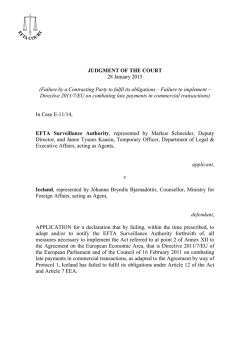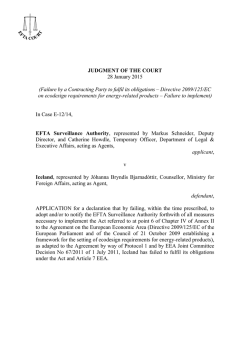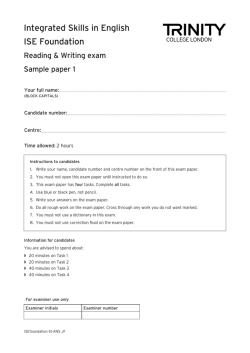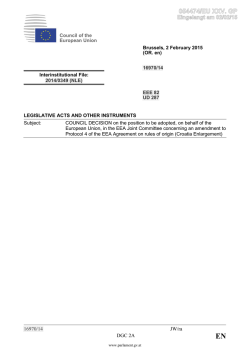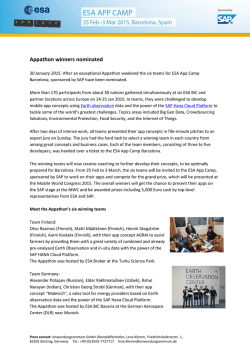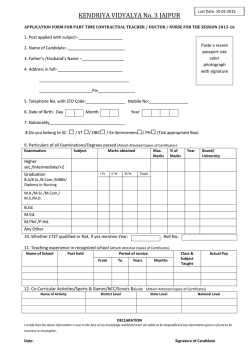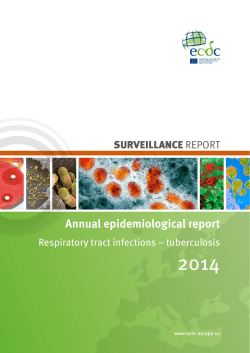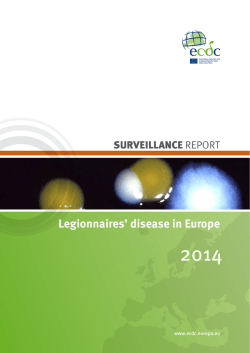
JUDGMENT OF THE COURT 28 January 2015 In
JUDGMENT OF THE COURT 28 January 2015 (Failure by a Contracting Party to fulfil its obligations – Failure to implement – Directive 2004/113/EC of 13 December 2004 implementing the principle of equal treatment between men and women in the access to and supply of goods and services) In Case E-13/14, EFTA Surveillance Authority, represented by Markus Schneider, Deputy Director, and Maria Moustakali, Officer, Department of Legal & Executive Affairs, acting as Agents, applicant v Iceland, represented by Jóhanna Bryndís Bjarnadóttir, Counsellor, Ministry for Foreign Affairs, acting as Agent, defendant, APPLICATION for a declaration that by failing to adopt, and/or to notify the EFTA Surveillance Authority forthwith of, the measures necessary to implement the Act referred to at point 21c of Annex XVIII to the EEA Agreement (Council Directive 2004/113/EC of 13 December 2004 implementing the principle of equal treatment between men and women in the access to and supply of goods and services), as adapted to the EEA Agreement by way of Protocol 1 thereto and by Joint Committee Decision No 147/2009 of 4 December 2009, within the time prescribed, Iceland has failed to fulfil its obligations under the Act and under Article 7 of the EEA Agreement. –2– THE COURT, composed of: Carl Baudenbacher, President, Per Christiansen and Páll Hreinsson (Judge-Rapporteur), Judges, Registrar: Gunnar Selvik, having regard to the written pleadings of the parties, having decided to dispense with the oral procedure, gives the following Judgment I 1 Introduction By application lodged at the Court Registry on 17 July 2014, the EFTA Surveillance Authority (“ESA”) brought an action under the second paragraph of Article 31 of the Agreement between the EFTA States on the Establishment of a Surveillance Authority and a Court of Justice (“SCA”), for a declaration that by failing to adopt, and/or to notify ESA forthwith of, the measures necessary to implement the Act referred to at point 21c of Annex XVIII to the EEA Agreement, that is Council Directive 2004/113/EC of 13 December 2004 implementing the principle of equal treatment between men and women in the access to and supply of goods and services (OJ 2004 L 373, p. 37) (“the Directive” or “the Act”), as adapted to the EEA Agreement by way of Protocol 1 thereto and by Joint Committee Decision No 147/2009 of 4 December 2009, within the time prescribed, Iceland has failed to fulfil its obligations under the Act and under Article 7 EEA. II 2 Law Article 7 EEA reads: Acts referred to or contained in the Annexes to this Agreement or in decisions of the EEA Joint Committee shall be binding upon the Contracting Parties and be, or be made, part of their internal legal order as follows: … (b) an act corresponding to an EEC directive shall leave to the authorities of the Contracting Parties the choice of form and method of implementation. –3– 3 Article 31 SCA reads: If the EFTA Surveillance Authority considers that an EFTA State has failed to fulfil an obligation under the EEA Agreement or of this Agreement, it shall, unless otherwise provided for in this Agreement, deliver a reasoned opinion on the matter after giving the State concerned the opportunity to submit its observations. If the State concerned does not comply with the opinion within the period laid down by the EFTA Surveillance Authority, the latter may bring the matter before the EFTA Court. 4 EEA Joint Committee Decision 147/2009 of 4 December 2009 amended Annex XVIII (Health and safety at work, labour law, and equal treatment for men and women) to the EEA Agreement by adding the Directive to point 21c of the Annex. 5 The Directive aims to create a framework for combating discrimination based on sex in access to and supply of goods and services, with a view to putting into effect the principle of equal treatment between men and women. It applies to all persons who provide goods and services, which are available to the public irrespective of the person concerned, as regards both the public and private sectors, including public bodies, and which are offered outside the area of private and family life and the transactions carried out in this context. 6 Article 17 of the Directive (with adaptations under point 4(d) of Protocol 1 EEA on Horizontal Adaptations, Article 5(2)(d) SCA and Article 1 of Protocol 1 SCA) reads: 1. Member States shall bring into force the laws, regulations and administrative provisions necessary to comply with this Directive by 21 December 2007 at the latest. They shall forthwith communicate to [ESA] the text of those provisions. … 7 Iceland indicated constitutional requirements for the purposes of Article 103 EEA. The six-month period for notification prescribed in Article 103 EEA expired on 4 June 2010. On 18 November 2011, Iceland notified a delay in the fulfilment of the constitutional requirements. 8 On 5 September 2012, Iceland notified that the constitutional requirements had been fulfilled. Consequently, the Directive entered into force on 1 November 2012. The time limit for the EEA/EFTA States to adopt the measures necessary to implement the Directive expired on the same date. –4– III Facts and pre-litigation procedure 9 By letter of 9 October 2012, ESA reminded Iceland of its obligation to implement the Directive into its legal order by 1 November 2012. 10 On 27 March 2013, having received no further information from Iceland, ESA issued a letter of formal notice. ESA concluded that by failing to adopt or, in any event, to inform ESA of the national measures it had adopted to implement the Directive, Iceland had failed to fulfil its obligations under the Directive and under Article 7 EEA. 11 By letter of 19 April 2013, Iceland stated that a bill amending Act No 10/2008 on Equal Status and Equal Rights of Women and Men, with the aim to fully implement the Directive, had been submitted to the Parliament on 5 March 2013. However the bill was not discussed and would be re-submitted to the Parliament in autumn 2013. The draft bill was enclosed with the letter. 12 On 26 June 2013, ESA delivered a reasoned opinion to Iceland, maintaining the conclusion set out in its letter of formal notice. Pursuant to Article 31(2) SCA, ESA required Iceland to take the measures necessary to comply with the reasoned opinion within two months following notification thereof, that is no later than 26 August 2013. 13 The time limit of 26 August 2013 expired without any further action having been taken by Iceland. 14 By email of 30 September 2013, ESA requested further information on the implementation of the Directive. By letter of 4 October 2013, Iceland restated that a bill implementing the Directive would be re-submitted to the Parliament in October 2013. By email of 22 November 2013, Iceland informed ESA that the bill had been re-submitted to the Parliament on 20 November 2013. 15 At a meeting held in Iceland on 19 May 2014, the representatives of the Icelandic Government informed ESA that on 16 May 2014, a bill had been adopted by the Parliament. However, the bill as adopted did not include the necessary provisions intended to implement the Directive, as such provisions were removed from the bill by the Parliament. Iceland stated that a bill aimed to implement the Directive would be submitted to the Parliament in autumn 2014. 16 On 2 July 2014, having received no further information as regards the implementation of the Directive, ESA decided to bring the matter before the Court pursuant to Article 31(2) SCA. IV 17 Procedure before the Court and forms of order sought On 17 July 2014, ESA lodged its application at the Court Registry. Iceland submitted a statement of defence which was registered at the Court on 30 September 2014. By letter dated 16 October 2014, and registered at the Court on 17 October 2014, ESA waived its right to submit a reply and consented to –5– dispense with the oral procedure should the Court wish to do so. On 20 November 2014, Iceland also consented to dispense with the oral procedure. 18 The applicant, ESA, requests the Court to: 1. Declare that by failing to adopt, and/or to notify the EFTA Surveillance Authority forthwith of, all the measures necessary to implement the Act referred to at point 21c of Annex XVIII to the EEA Agreement (Council Directive 2004/113/EC of 13 December 2004 implementing the principle of equal treatment between men and women in the access to and supply of goods and services, as adapted to the EEA Agreement by way of Protocol l and by Joint Committee Decision No 147/2009 thereto, within the time prescribed, Iceland has failed to fulfil its obligations under the Act and under Article 7 of the Agreement. 2. Order Iceland to bear the costs of these proceedings. 19 The defendant, Iceland, submits that the facts of the case as set out in the application are correct and undisputed. Iceland disputes neither the declaration nor the order sought by ESA. 20 After having received the express consent of the parties, the Court, acting on a report from the Judge-Rapporteur, decided to dispense with the oral procedure pursuant to Article 41(2) of the Rules of Procedure (“RoP”). V Findings of the Court 21 Article 3 EEA imposes upon the Contracting Parties the general obligation to take all appropriate measures, whether general or particular, to ensure fulfilment of the obligations arising out of the EEA Agreement (see, inter alia, Case E-8/14 ESA v Iceland, judgment of 10 November 2014, not yet reported, paragraph 17, and the case law cited). 22 Under Article 7 EEA, the Contracting Parties are obliged to implement into their legal order all acts referred to in the Annexes to the EEA Agreement, as amended by decisions of the EEA Joint Committee. The Court points out that the lack of direct legal effect in Iceland of acts referred to in decisions from the EEA Joint Committee, makes timely implementation crucial for the proper functioning also in Iceland of the EEA Agreement. The EFTA States find themselves under an obligation of result in that regard. 23 Decision 147/2009 entered into force on 1 November 2012. The time limit for the EEA/EFTA States to adopt the measures necessary to implement the Directive expired on the same date. 24 The question of whether an EEA/EFTA State has failed to fulfil its obligations must be determined by reference to the situation in that State as it stood at the end of the period laid down in the reasoned opinion (see, inter alia, ESA v –6– Iceland, cited above, paragraph 19, and the case law cited). It is undisputed that Iceland did not adopt measures necessary to implement the Directive before the expiry of the time limit given in the reasoned opinion. 25 Since Iceland did not in fact implement the Directive within the time limit prescribed, there is no need to examine the alternative form of order sought against Iceland for failing to notify ESA of the measures implementing the Directive. 26 It must therefore be held that, by failing, within the time prescribed, to adopt the measures necessary to implement into its national legislation the Act referred to at point 21c of Annex XVIII to the Agreement on the European Economic Area, that is Council Directive 2004/113/EC of 13 December 2004 implementing the principle of equal treatment between men and women in the access to and supply of goods and services, as adapted to the Agreement by way of Protocol 1 thereto and by Joint Committee Decision No 147/2009 of 4 December 2009, Iceland has failed to fulfil its obligations under the Directive and under Article 7 EEA. VI 27 Costs Under Article 66(2) RoP, the unsuccessful party is to be ordered to pay the costs if they have been applied for in the successful party’s pleadings. Since ESA has requested that Iceland be ordered to pay the costs, and the latter has been unsuccessful and none of the exceptions in Article 66(3) apply, Iceland must therefore be ordered to pay the costs. On those grounds, THE COURT hereby: 1. Declares that by failing, within the time prescribed, to adopt the measures necessary to implement the Act referred to at point 21c of Annex XVIII to the EEA Agreement (Council Directive 2004/113/EC of 13 December 2004 implementing the principle of equal treatment between men and women in the access to and supply of goods and services), as adapted to the EEA Agreement by way of Protocol l thereto and by Joint Committee Decision No 147/2009 of 4 December 2009, Iceland has failed to fulfil its obligations under the Act and under Article 7 of the EEA Agreement. –7– 2. Orders Iceland to bear the costs of these proceedings. Carl Baudenbacher Per Christiansen Páll Hreinsson Delivered in open court in Luxembourg on 28 January 2015. Gunnar Selvik Registrar Carl Baudenbacher President
© Copyright 2026
